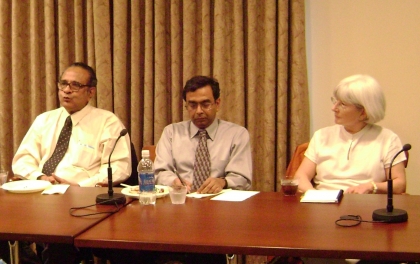Public Health and Development | Pardee House Seminar

Examining the challenges and opportunities to improve public health systems in India offers lessons for public health issues on a global scale, according to a panel of experts who spoke at the Pardee House Seminar on June 11.
The seminar – titled Leadership for Public Health and Development – featured panelists including Dr. V.I. Mathan of the India National Institute of Epidemiology and Dr. Srinath Reddy of the Public Health Foundation of India as well as Professor Deborah Maine of the BU School of Public Health and Professor Adil Najam, director of the Pardee Center for the Study of the Longer-Range Future. Professor Jerry Keusch, director of BU’s Global Health Initiative and Associate Provost for Global Health at the BU Medical campus, served as moderator.
Dr. Mathan and Dr. Reddy spoke of India’s unique circumstances of more than 750 million people — or two-thirds of the population — living in poverty, and no government public health programs and very few practicing public health specialists outside of academia. At the same time, India has serious public health issues including a 58 percent infant mortality rate and one-third of the world’s TB patients, they said.
Dr. Mathan spoke of two specific training programs sponsored by the India Council of Medical Research in collaboration with the U.S. Centers for Disease Control that grant master’s degrees in public health and epidemiology to current government health officials. The goal of the programs is to have at least one public health practitioner in every district in India by 2012. “The outcomes will be better information for decision-makers and at the street level, better control of epidemic outbreaks, better immunization, and better mother and child health” he said, adding that there have already been significant positive results in three states where 10 public health specialists who have been through the programs are now working.
Dr. Reddy spoke of public health as a human rights issue and cited the need for training and practice in public health to go beyond traditional methods and focus. “The determinants of public health are far more diverse than before” he said, adding that family and community level issues as well as national and global issues, such as global trade policies, agricultural practices, deforestation, and global warming must be considered. “When we talk of public health, we have to think about upstream policy as well as downstream delivery of services,” he said. “Health systems and health services are becoming increasingly important in international discussions.”
Professor Maine, who has worked on women and infant health issues in India for more than 15 years, said a key concern as programs in India develop should be coverage and quality, adding that it is important to institute, deliver and monitor the effectiveness of good quality programs that serve large numbers of people. She emphasized that making sure the appropriate infrastructure is in place to deliver services is critical. “If you can do a great procedure but only for a few people, that’s not public health” she said, adding “The goal should be good quality services that reach many people.”
Professor Najam stressed the need to make connections between public health and security issues as well as other global issues, such as climate change. He noted that one of the major impacts of climate change will be on water resources, with an anticipated increase in water-borne diseases.
The 50 seminar attendees included participants of the Teach The Teacher To Teach (T5) program at the BU School of Public Health, which is a pilot program aimed specifically at faculty development for the new Indian schools of public health that Dr. Mathan and Dr. Reddy have been instrumental in establishing.
The Pardee House Seminar was co-sponsored by the Frederick S. Pardee Center for the Study of the Longer-Range Future, the Global Health Initiative at Boston University and the Boston University School of Public Health.